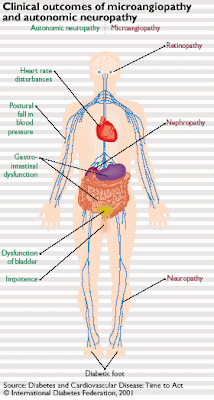Autonomic neuropathy is a group of symptoms that occur when there is damage to nerves that regulate blood pressure, heart rate, bowel and bladder emptying, digestion, and other body functions.http://health.nytimes.com/health/guides/disease/autonomic-neuropathy/overview.html
Autonomic neuropathy is a form of peripheral neuropathy. It is a group of symptoms, not a specific disease. There are many causes.
Autonomic neuropathy involves damage to the nerves that run through a part of the peripheral nervous system. The peripheral nervous system includes the nerves used for communication to and from the brain and spinal cord (central nervous system) and all other parts of the body, including the internal organs, muscles, skin, and blood vessels.
Damage to the autonomic nerves affects the function of areas connected to the problem nerve. For example, damage to the nerves of the gastrointestinal tract makes it harder to move food during digestion (decreased gastric motility).
Autonomic neuropathy affects the nerves that regulate vital functions, including the heart muscle and smooth muscles.
Damage to the nerves supplying blood vessels causes problems with blood pressure and body temperature.
Autonomic neuropathy is associated with the following:
Alcoholic neuropathy
Diabetic neuropathy
Disorders involving scarring and hardening (sclerosis) tissues
Guillain Barre syndrome or other diseases that inflame nerves
HIV and AIDS
Inherited nerve disorders
Parkinson's disease
Surgery or injury involving the nerves
Use of anticholinergic medications
Symptoms vary depending on the nerve(s) affected. They usually develop gradually over years.
Symptoms may include:
Digestive tract
Constipation
Diarrhea
Feeling full after only a few bites (early satiety)
Nausea after eating
Swollen abdomen
Unintentional loss of more than 5% of body weight
Vomiting of undigested food
Heart
Blood pressure changes with position
Dizziness that occurs when standing up
Urinary tract
Difficulty beginning to urinate
Feeling of incomplete bladder emptying
Urinary incontinence (overflow incontinence)
Other symptoms
Abnormal sweating
Fainting
Heat intolerance, induced by exercise
Male impotence
A medical history and general physical exam are critical. A brain and nervous system (neurological) examination may show evidence of injury to other nerves. However, it is very difficult to directly test for autonomic nerve damage.
Signs of autonomic neuropathy include:
Abnormal sounds in the abdomen, indicating decreased gastric movement (motility)
Decrease of blood pressure upon standing up (postural hypotension)
Sluggish pupil reaction in the eye
Swollen (distended) abdomen
Swollen (distended) bladder
Occasionally, other symptoms may indicate a problem in the function of the autonomic nervous system, including:
Difficulty swallowing
Excessive sweating
Irregular heart rhythms
High blood pressure
Rapid or slow heart rate
Special measurements of sweating and heart rate are called "autonomic testing" and can assist in diagnosis and treatment.
Other tests include:
Measurement of blood pressure lying down, sitting, and standing
Measurement of changes in heart rate
Upper GI
Esophagogastroduodenoscopy (EGD)
Isotope study
Voiding cystourethrogram (VCUG) or other tests of bladder function
Other tests for autonomic neuropathy are based on the suspected cause of the disorder, as suggested by the history, symptoms, and the way symptoms developed.
Treatment is supportive and may need to be long-term. Several treatments may be attempted before a successful one is found.
Various strategies may be used to reduce symptoms in the feet, legs, and arms. These include:
Florinef and salt tablets to increase fluid volume in blood vessels
Fludrocortisone or similar medications to reduce postural hypotension
Medications to help with salt and fluid retention
Proamatine to prevent a drop in blood pressure when standing
Sleeping with the head raised
Use of elastic stockings
Treatments for reduced gastric motility include:
Medications that increase gastric motility (such as Reglan)
Sleeping with the head raised
Small, frequent meals
Diarrhea, constipation, bladder problems, and other symptoms are treated as appropriate. These symptoms may respond poorly to treatment. Drugs that block bladder contractions may be used to help with urinary control problems.
Phosphodiesterase type 5 (PDE-5) drugs, such as sildenafil (Viagra), vardenafil (Levitra), and tadalafil (Cialis) are safe and effective for treating impotence in patients with diabetes.
The outcome varies. If the cause can be found and treated, there is a chance that the nerves may repair or regenerate. The symptoms may improve with treatment, or they may continue or get worse, even with treatment.
Most symptoms of autonomic neuropathy are uncomfortable, but they are rarely life-threatening.
Information blog for people suffering from both Neuropathy and HIV. An opportunity to exchange experiences, tips and opinions. This site is non-funded, non-commercial and free of advertising.
Friday, 20 May 2011
Autonomic Neuropathy - what's that?
You may hear or read the term 'autonomic neuropathy' and this may cause confusion. It causes a problem for doctors too because the symptoms are easily identifiable with a whole range of conditions and you may also have had some or all of them for some period of time before your peripheral neuropathy was diagnosed. For an general explanation, see the blog website (www.neuropathyandhiv.nl) and click on the Site in English button but this description from the New York Times of May 20th 2011 gives you a good idea of how it works.
Labels:
autonomic-neuropathy
Subscribe to:
Post Comments (Atom)

No comments:
Post a Comment
All comments welcome but advertising your own service or product will unfortunately result in your comment not being published.